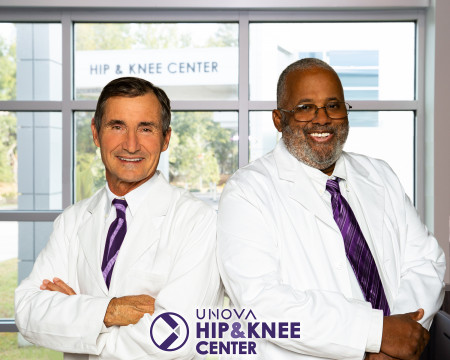Leading Orthopedic Surgeons at UNOVA Hip & Knee Center Set the Record Straight on Joint Replacements for Arthritis Awareness Month

LADY LAKE, Fla., May 18, 2022 (Newswire.com) - In honor of Arthritis Awareness Month in May, the experts of UNOVA Hip & Knee Center are setting the record straight when it comes to joint health. Arthritis is the single greatest cause of chronic hip and knee pain and disability in America. According to a 2020 study by the CDC, one in four of all adults have arthritis. Nearly a quarter of the U.S. population is dealing with chronic pain due to a disease that has treatable options. Drs. J. Madume Kerina and Thomas Hatton McCoy, orthopedic surgeons leading the UNOVA Hip & Knee Center in Lady Lake, Florida, share insight on the necessary treatment options depending on the severity of a patient's condition.
Symptoms of arthritis include chronic pain, joint stiffness or tenderness, swelling around the joint, decreased or limited range of motion, and warmth and redness around the joint. Depending on the severity of the case, physicians may recommend treatment options such as physical therapy to strengthen supporting muscles and improve range of motion, topical solutions to reduce joint aches and pains, anti-inflammatory or pain-reducing drugs, disease-modifying anti-rheumatic drugs (DMARDs), corticosteroid injections and/or non-steroidal anti-inflammatory drugs (NSAIDs). When lifestyle changes and medicine aren't enough, surgery may be the recommended option.
According to a study published by Proceedings of the National Academy of Sciences (PNAS), "Osteoarthritis (OA) is the most prevalent joint disease with knee OA accounting for more than 80% of the disease's total burden and affecting at least 19% of American adults aged 45 years and older." Furthermore, the study argues that knee OA has doubled since the mid-20th century, citing obesity and extended life expectancy as two of the leading causes.
"With chronic knee pain due to osteoarthritis affecting a significant number of adults, it's our responsibility as orthopedic surgeons to find solutions to improve our patients' quality of life," says Dr. Kerina.
"Not all knee osteoarthritis cases need a surgical solution, but people need to know that a total knee replacement (TKR) isn't their only option when surgery is necessary."
Orthopedic surgeons can provide equal or better clinical and functional outcomes to patients suffering from arthritis, utilizing a "partial" or unicompartmental approach. This minimally invasive surgery uses a smaller incision and, unlike a TKR, only resurfaces the damaged bone and cartilage. As a result, all the knee's ligaments and tendons and their muscles are left undisturbed while the knee is returned to its pre-disease state, leading to a more natural-feeling knee.
According to a 2021 study published by the National Library of Medicine, "Approximately 50% of knees needing replacement are appropriate for unicompartmental knee replacements (UKR), yet current usage is only 10% given the higher rate of revisions." However, even with a higher revision rate, the study mentions that there has been "a drive towards more patient-directed outcomes" with pain relief, the restoration of function, and improved quality of life as the core reason for undergoing a procedure. The study concluded that the "functional outcomes and quality of life matched TKRs and UKRs overall."
"The unicompartmental knee replacement is ideal for patients who have bone on bone arthritis in one compartment of the knee without relief from standard non-surgical treatments," explains Dr. McCoy. "Regardless of whether we perform a UKR or TKR, using a holistic approach is critical with our patients. Our unique comprehensive patient partnership program is designed to help patients be in the best physical, functional, and mental state before, during, and after surgery. Since having a walking disability can reduce life expectancy, our goal is to improve the quality of our patients' lives, as long as that may be."
Forward-thinking innovators who are dedicated to reimagining global health, Drs. Kerina and McCoy use a patient-centered, individualized, research-based approach to their work. By empowering patients and other practitioners to embrace outcomes-based healthcare, patients can spend less time in pain and experience much faster recovery than traditional in-patient total joint replacement patients.
To learn more about outpatient total knee replacement in an ambulatory surgery setting, contact the experts at UNOVA Hip & Knee. Call the Center at 352-973-4070 or visit UNOVAHipAndKnee.com for more information.
Media Contact:
Karolyn Raphael
Karolyn@wingermarketing.com
Source: UNOVA Hip & Knee Center
